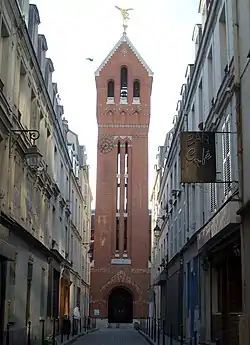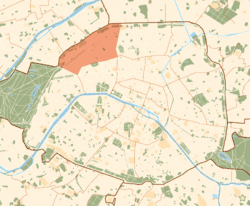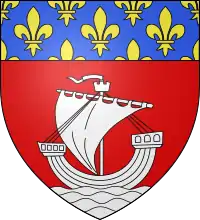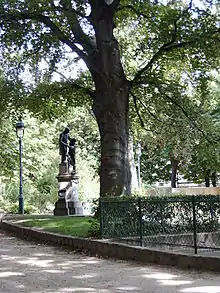17th arrondissement of Paris
The 17th arrondissement of Paris (XVIIe arrondissement) is one of the 20 arrondissements of the capital city of France. In spoken French, this arrondissement is referred to as dix-septième (pronounced [di sɛtjɛm]).
17th arrondissement of Paris
XVIIe arrondissement | |
|---|---|
 The clock tower of the Church of Saint Michel des Batignolles | |
 Paris and its closest suburbs | |
| Country | France |
| Department | Paris |
| Commune | Paris |
| Government | |
| • Mayor | Geoffroy Boulard |
| Area | |
| • Total | 5.67 km2 (2.19 sq mi) |
| Population (2017-01-01)[1] | |
| • Total | 167,288 |
| • Estimate (2005) | 160,300 |
| • Density | 30,000/km2 (76,000/sq mi) |
| 1 Population sans doubles comptes: single count of residents of multiple communes (e.g. students and military personnel). | |
 Paris Coat of Arms 20 arrondissements of Paris | |||||||||||||||||||||||||||||||||||||
|---|---|---|---|---|---|---|---|---|---|---|---|---|---|---|---|---|---|---|---|---|---|---|---|---|---|---|---|---|---|---|---|---|---|---|---|---|---|
| |||||||||||||||||||||||||||||||||||||
The arrondissement, known as Batignolles-Monceau, is situated on the right bank of the River Seine.
Geography
The land area of this arrondissement is 5.669 km2 (2.189 sq. miles, or 1,401 acres).
Situated on the right bank of the River Seine, this arrondissement is divided in 4 administrative districts: Ternes and Monceau in the southwestern part, two upper-class districts which are more Haussmannian in style; in the middle of the arrondissement, the Batignolles district, an area mostly occupied by young families or couples, with a marked gentrification process; in the northeastern part, the Épinettes district, a former industrial district gone residential, which is mainly middle class and also experiencing a less advanced gentrification process.[2][3]
The town hall of the 17th arrondissement is on Rue des Batignolles. It is the only town hall of Paris to be located in a modern building. The original building was torn down in 1971 to make room for the current edifice.[4] The 17th arrondissement also hosts the Palais des Congrès of Paris, which is a large exhibition center with an associated high-rise hotel, the Hyatt Regency Paris Étoile, the largest in the city.
Demographics

The peak population of Paris's 17th arrondissement was reached in 1954, when it had 231,987 inhabitants. Today, the arrondissement remains dense in population and business activity, with 160,860 inhabitants and 92,267 jobs as of the most recent census (1999).
Historical population
| Year (of French censuses) |
Population | Density (inh. per km2) |
|---|---|---|
| 1872 | 101,804 | 17,955 |
| 1954 (peak of population) | 231,987 | 40,922 |
| 1962 | 227,687 | 40,164 |
| 1968 | 210,299 | 37,096 |
| 1975 | 186,293 | 32,862 |
| 1982 | 169,513 | 29,902 |
| 1990 | 161,935 | 28,565 |
| 1999 | 160,860 | 28,375 |
| 2009 | 168,454 | 29,710 |
Immigration
| Born in Metropolitan France | Born outside Metropolitan France | |||
|---|---|---|---|---|
| 77.7% | 22.3% | |||
| Born in Overseas France |
Born in foreign countries with French citizenship at birth1 | EU-15 immigrants2 | Non-EU-15 immigrants | |
| 1.1% | 4.6% | 5.1% | 11.5% | |
| 1 This group is made up largely of former French settlers, such as pieds-noirs in Northwest Africa, followed by former colonial citizens who had French citizenship at birth (such as was often the case for the native elite in French colonies), and to a lesser extent foreign-born children of French expatriates. Note that a foreign country is understood as a country not part of France in 1999, so a person born for example in 1950 in Algeria, when Algeria was an integral part of France, is nonetheless listed as a person born in a foreign country in French statistics. 2 An immigrant is a person born in a foreign country not having French citizenship at birth. Note that an immigrant may have acquired French citizenship since moving to France, but is still considered an immigrant in French statistics. On the other hand, persons born in France with foreign citizenship (the children of immigrants) are not listed as immigrants. | ||||
Economy
The southwestern part of the arrondissement is very dense in offices, mostly for services. Several big companies have their headquarters there.
The head office of Dailymotion is located in the Immeuble Horizons 17.[5][6] When it existed, Gaz de France had its head office in the 17th arrondissement.[7]
Batignolles and Épinettes, two former industrial areas, are now mostly residential. The area around the avenue de Clichy, shared with the 8th, 9th and 18th arrondissement of Paris, is occupied by a lot of shops. This is the third biggest avenue of Paris in terms of sales.
Cityscape
Places of interest
 Paris Coat of Arms 20 arrondissements of Paris | |||||||||||||||||||||||||||||||||||||
|---|---|---|---|---|---|---|---|---|---|---|---|---|---|---|---|---|---|---|---|---|---|---|---|---|---|---|---|---|---|---|---|---|---|---|---|---|---|
| |||||||||||||||||||||||||||||||||||||
- Arc de Triomphe (partial)
- Marché des Batignolles
- Marché Poncelet
- Rue de Levis
- Musée national Jean-Jacques Henner
- Palais des Congrès and Hôtel Concorde Lafayette
- Square des Batignolles
- Cité des Fleurs
- Place de Clichy
- Parc Clichy-Batignolles
- Square des Épinettes
Education
The Swedish school Svenska Skolan Paris is in the arrondissement.[8]
References
- "Populations légales 2017". INSEE. Retrieved 6 January 2020.
- " Sur la piste des bonnes affaires ", Le Figaro, 20 October 2010
- "Les Epinettes, conservatoire d'architecture". durififiauxbatignolles.com. Archived from the original on 23 March 2012.
- "Archived copy". Archived from the original on 29 August 2008. Retrieved 28 August 2008.CS1 maint: archived copy as title (link)
- Giusti, Nathalie. "Inauguration du 140 boulevard Malesherbes" (Archive). Le Nouvel Observateur. 27 July 2012. Retrieved 24 May 2014.
- "About" (Archive). Dailymotion. Retrieved 24 May 2014.
- "Appendix 3a ACCORD DE CONFIDENTIALITÉ." Request for proposals for regasification capacity subscriptions Montoir de Bretagne terminal expansion project. Gaz de France. December 2006. 14/20. Retrieved on 7 July 2010. "Gaz de France, société anonyme dont le siège social est sis 23 rue Philibert Delorme à Paris 17ème,"
- French home page. Svenska Skolan Paris. Retrieved 20 October 2015. "9 rue Médéric 75017 Paris France"
External links
| Wikimedia Commons has media related to Paris 17e arrondissement. |
 17th arrondissement travel guide from Wikivoyage
17th arrondissement travel guide from Wikivoyage
